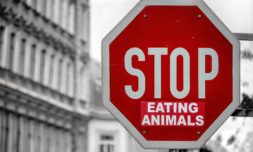Recent calls for more awareness about the cruelty behind livestock exportation in addition to a proposed law obliging farmers to address the environmental impact of meat and dairy production indicates a shift may finally be afoot.
Last year, it was revealed that the agriculture industry is responsible for about a quarter of our total greenhouse gas emissions, the main contributor being livestock and fisheries.
Yet although the drastic environmental impact of meat and dairy production has been at the forefront of the climate conversation for some time now, little has been done to address it – at least from a top down level, that is.
Most often, the solutions posed are targeted towards the individual, encouraging consumers to ‘give Veganuary a go’ or experiment with Meat Free Mondays, for example.
Rarely do we see those in charge of keeping the wheels turning held accountable, let alone forced into changing their ways for the benefit of our planet.
:no_upscale()/cdn.vox-cdn.com/uploads/chorus_asset/file/24356383/85755_20191125_sinking_Queen_Hind_Midia_RO_7.jpg)
Enough is enough, however, and today a shift may finally be afoot.
Not only as a result of how urgently we need to get the ongoing destruction of nature under control but thanks to recent calls for more awareness about the animal welfare crisis.
According to Vox, Europe is currently considering a ban on the perilous practice of transporting cattle, sheep, pigs, and poultry birds overseas for slaughter.
It comes after numerous accounts of failed exportations and the realities of these journeys, some detailing the drowning of nearly every creature onboard due to the ships sinking, others highlighting the horrific abuse they regularly face along the way.
:format(webp):no_upscale()/cdn.vox-cdn.com/uploads/chorus_asset/file/24357753/qSoGV_the_european_union_exports_hundreds_of_millions_of_animals_for_slaughter_abroad_2.png)
Surprisingly, it was Germany – one of the top players in the livestock exporting bloc – that kickstarted this movement.












/cdn.vox-cdn.com/uploads/chorus_image/image/71847408/GettyImages_1237510731__1_.0.jpg)








